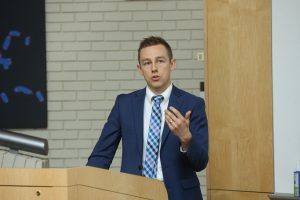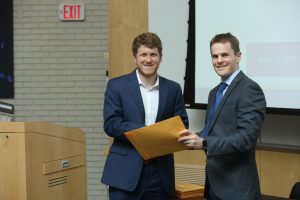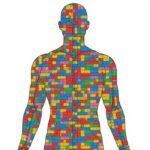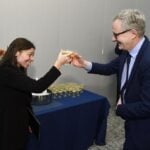Young Investigators’ Day Committee Recognizes Two INBT PhD Researchers

Two INBT PhD candidates, John Hickey and Michael Blatchley, were recognized for their outstanding research contributions by the Young Investigators Day Program at the Johns Hopkins University School of Medicine. The two presented their research at the Young Investigator’s Day Ceremony on April 9, and received a certificate and a $1,000 cash award.
Hickey received the Hans J. Prochaska Award and Blatchely received the Paul Talalay Award. Each award carries a distinct honor and specific history to the legacy of biomedical research at Johns Hopkins, and a number of named awards were established and are generously supported by friends and family in memory of past students or faculty members.
John Hickey
At the ceremony, Hickey presented his research on, “Engineering Biomaterials for T Cell Immunotherapy.” His research involves engineering next-generation biomaterials to create more effective cancer immunotherapies through control of particle and hydrogel biomaterial properties. Specifically, they want to target and activate rare tumor-specific T cells by creating artificial cells and lymph node-like environments from these materials.
“It is humbling to receive this award, and I am very grateful to the many people and organizations that contributed to the success of my project, especially support from my two extremely talented PIs (Dr. Jonathan Schneck and Hai-Quan Mao), students I mentored, the BME and INBT programs, and my wife,” said Hickey.
At the end of April, Hickey will start a postdoctoral fellowship in Garry Nolan’s lab at Stanford University in the Department of Microbiology & Immunology. He will be involved in researching and developing new technologies to increase the ability to perform systems immunology analyses, and apply these to important health issues like cancer and autoimmunity.

Michael Blatchley
Blatchley’s presented his research on, “Re-constructing the Vascular Regenerative Niche to Investigate Blood Vessel Formation.” He uses engineered biomaterials to study how human blood vessels form in a laboratory setting. This biomimetic platform helps identify potential therapeutic targets to promote and inhibit vascular regeneration to treat cardiovascular disease and cancer, respectively, and to enhance our understanding of how to best construct vascular networks to build functional tissues.
“It is an incredible honor to be recognized among so many great young scientists. I am thankful for the exemplary mentorship I have received and lucky to have so many wonderful colleagues to discuss ideas, learn new experimental techniques, and debate the latest findings in the literature,” said Blatchley.
Blatchley is a 6th year PhD candidate. He is finalizing his research and applying for postdoctoral fellowships.

Story by Gina Wadas
Latest Posts
-
 Cellular building blocks may enable new understanding of the body’s “machinery”
December 19, 2025
Cellular building blocks may enable new understanding of the body’s “machinery”
December 19, 2025
-
 Biomedical Engineer Jamie Spangler Receives President’s Frontier Award
December 15, 2025
Biomedical Engineer Jamie Spangler Receives President’s Frontier Award
December 15, 2025
-
 Johns Hopkins Postdoc Named in Forbes `30 Under 30′ List
December 8, 2025
Johns Hopkins Postdoc Named in Forbes `30 Under 30′ List
December 8, 2025


